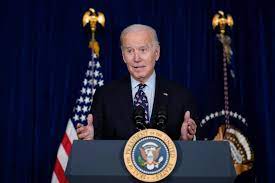Washington, Dec 14: President Joe Biden signed an executive order Monday aimed at rebuilding the public’s trust in government by making it easier to do things like renew passports, apply for Social Security benefits and get aid after natural disasters.
The idea is to put the public and customer service at the centre of federal operations, saving time, energy, frustration and potentially money by offering better and more efficient services for the millions of routine interactions people have with the government.
“The bottom line is we’re going to make the government work more effectively,” Biden said before signing the order in the Oval Office. “This will go a long way to restoring faith in the government.”
The measure is aimed at reducing the current bureaucratic runaround, under which people often have to visit offices, endure long phone calls or struggle with the delays of mail and fax machines when trying to contact federal agencies.
That’s a tall order, considering that the federal government has persisted in its lumbering ways despite repeated attempts over generations to make it nimbler. President Bill Clinton famously pledged in 1993 to “reinvent government” with an interagency task force.
The signing comes at a critical juncture for Biden to show that he can deliver results. T
The country has seen a strong economic rebound as coronavirus relief programs sent money directly to Americans. But support for the president has slumped as the United States faces inflation at a nearly four-decade high and the coronavirus pandemic lingers.
The administration has responded by trying to amplify its message that government can make people’s lives easier.
“This executive order is really focused on how the federal government delivers services to the public and ensuring that we deliver high-quality products to the public,” said Neera Tanden, a senior adviser to the president.
The goal is to implement most of the order’s changes across 17 federal agencies within the next year. Officials said that existing funds should be enough for agencies to pay for improvements and that better service and efficiency would ultimately save the government money.
Paul Light, a public policy professor at New York University and an expert on the federal bureaucracy, said the initiative could be a big deal, although the Biden administration will face obstacles.
“The problem is not in the hope but in the bureaucratic morass,” Light said. “The fight to improve government services requires a broad retooling of the bureaucratic wiring and flattening of the hierarchy. The federal government may be willing, but its technology is ancient, its personnel system sluggish, the bureaucratic layering unrelenting.” For retirees and the nearly 4 million Americans who turn 65 each year, the order requires that they be able to claim Social Security benefits online more easily.
Medicare recipients are to be able to access personalized online tools for saving money on drugs and managing their health care. Taxpayers will be able to schedule callbacks with the IRS instead of waiting on hold or having to manage issues through letters and faxes.
Efforts such as these should bring government services into the digital era, said Bill Sweeney, senior vice president of government affairs for AARP, an association for older Americans.
“We do our banking online,” Sweeney said. “We do our work online. We can order food online. We can order groceries from our phones. I think people are accustomed to that now and they’re demanding that government keep up as well.”
For travellers, Americans will be able to renew their passports online instead of having to print forms and pay with a paper check or money order. New security machines and computers with advanced screening features are to streamline the process of going through security lines for the roughly 2 million people who fly daily.
The 45 million people with student debt will be able to manage their federal loans through a single portal, instead of several websites with different passwords. Paperwork is also to be reduced for people seeking loan forgiveness.
Natural disasters strike about 25 million US households and small businesses each year. The survivors seeking federal aid should no longer be required to complete multiple forms across several agencies while being able to use virtual inspections and smartphone pictures of the damage to support claims.
Military veterans are to be able to access their benefits with a single login. Poorer families should find it easier to certify their incomes and enrol in eligible social safety net programs without the extra paperwork.
Loan programs for small businesses and farmers are to become more responsive. Families receiving food aid should be able to buy groceries online. It should become easier to update mailing addresses with the government or change names with the Social Security Administration.
Anne Zimmerman, an accountant based in the Cincinnati area and co-chair of the advocacy group Small Business for America’s Future, said the changes in the order are necessary because companies are frequently on their own when navigating the federal bureaucracy.
“It’s needed because things have really gotten worse,” Zimmerman said. “There’s too big a labyrinth to weed your way through when you’re trying to deal with the government.”
Why hasn’t all of this happened earlier?
Officials said the pandemic caused increased calls to the IRS and other agencies. It also showed how the government could adjust and innovate despite closed offices and remote workers.
Even if government services improve, it remains unclear if that will pay off politically for Biden, whose efforts to steer the economy to the strongest growth since 1984 have been overshadowed by inflation.
Roughly a third of Americans called the economy “good” under the president’s watch, down from 47% in June, according to a survey this month by AP-NORC Centre for Public Affairs Research. The poll found that 48% approve of Biden, while 51% disapprove. (AGENCIES)


